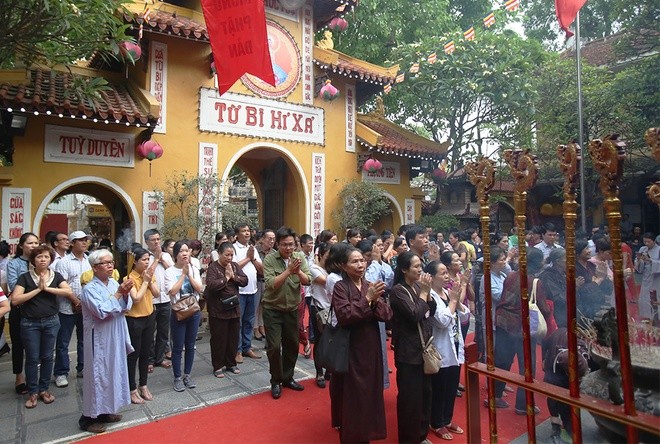(VOVworld) – The 14th National Assembly approved the Law on Belief and Religion at its 2nd session on November 18. Religious followers appreciate the law because it guarantees freedom of belief and religion for all people. But some foreign media have run articles that misunderstand or intentionally distort Vietnam’s law.
 |
| Buddhist followers in a prayer ritual at Quan Su pagoda in Hanoi |
Freedom of religion has been the most frequently discussed human rights issue. The right to practice religion has been widely acknowledged in Vietnamese and international legal documents on human rights.
The rights to religion and belief in international law
Some foreign media outlets said that civilized nations don’t have the Law on Belief and Religion and Vietnam’s Law on Belief and Religion approved by the National Assembly doesn’t support human rights. Here are some facts:
Freedom of religion was defined in the Universal Declaration on Human Rights (UDHR) in 1948, the first international document on human rights prohibiting religious discrimination. Contents of the UDHR were specified in Article 18 and 20 of the International Covenant on Civil and Political Rights adopted by the UN in 1966. Vietnam ratified the Convention in 1982. Article 18 says: “Everyone shall have the right to freedom of thought, conscience and religion. This right shall include freedom to have or to adopt a religion or belief of his choice, and freedom, either individually or in community with others and in public or private, to manifest his religion or belief in worship, observance, practice and teaching.”
In March, 1993, the UN Human Rights Council issued resolution 25 including an article calling on countries to ensure freedom of ideology, conscience, and religion in accordance with their Constitutions and laws, and possible measures to avoid intolerance of or discrimination against religion.
Article 1 of the 1905 French law describes the purpose of the act, which is to ensure freedom of conscience and to guarantee the free exercise of religion under the provisos enacted hereafter in the interest of public order. Article 25 declares that all worship services organized in headquarters of religious organizations are under the government’s oversight in the interests of public security. The German Constitution defines that activities of a religious organization might be restricted or banned if its purposes and activities violate the criminal code or threaten the regime.
Countries have agreed that there is no absolute freedom of belief and religion. It’s not true that countries don’t have a law on belief and religion as some foreign media have said.
Vietnam’s law matches international standards on religion
Freedom of belief and religion was acknowledged in Vietnam’s first Constitution in 1946 and was reaffirmed in the Constitution in 1959, 1980, and 2013. The 1946 Constitution said: “All people have freedom of belief”. The latest 2013 Constitution declares: “All people have freedom of belief and religion, to follow or not follow a religion. Religions are equal before the law. The state respects and protects the right to belief and religion. No one is allowed to violate the freedom of belief and religion or take advantage of belief and religion to violate the law.”
The Law on Belief and Religion adopted by the National Assembly on November 18, 2016, has improved Vietnam’s legal system and showed Vietnam’s responsibility to international law, including the UN Covenant on Civil and Political Rights.
Religious dignitaries told the National Assembly that the approval of the law was a turning point in Vietnam’s religious policy which encourages religious followers to promote the values of religions and patriotism and combat hostile forces’ intention to sabotage socialism.